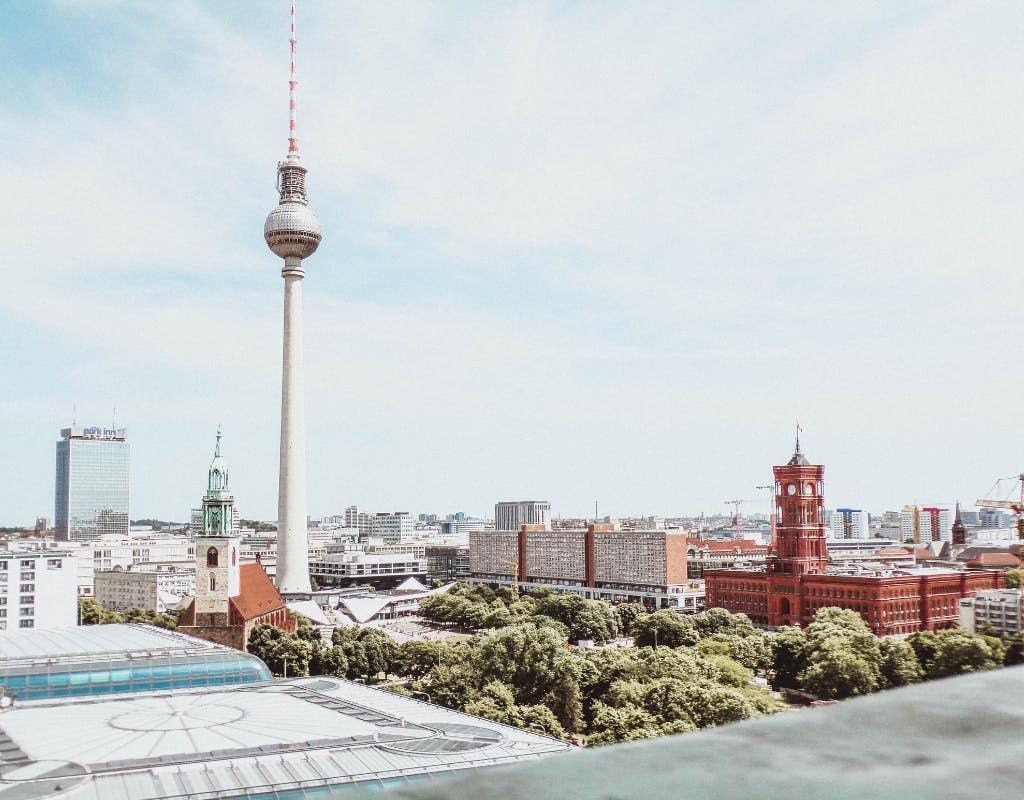The EU Blue card was initially introduced in 2012 by Germany to fill skill shortages in certain professions by cutting bureaucracy and making immigration for non-EU citizens easier. It is often compared to the US Green Card which serves a similar purpose. As the Blue Card, however, requires a university degree, skilled workers who for example went through an intensive training boot camp or hold a degree in an unrelated subject, are not able to apply for it. To counteract this problem, Germany offers affected a similar option that requires no degree while still offering the benefits of a Blue Card: The German Work Permit.
Find out everything you need to know about the EU Blue Card and the German Work Permit in our ultimate guide!
EU Blue Card
The EU Blue Card is a work and residency permit as well as a visa that applies to all EU member states. Skilled non-EU citizens who hold an EU Blue Card have the right to work and reside in all EU member states.
- A Blue Card costs 100 euros initially with a fee for renewal between 93 and 96 euros depending on the time period.
- It is initially granted for the length of the work contract plus three months, or a maximum of 4 years if the contract is unlimited.
- The Blue Card is valid in all European member states, except Denmark, Irland and United Kingdom.
- The primary benefit of the Blue Card is access to the same social programs as citizens, including education, healthcare, and travel.
Who is eligible for an EU Blue Card?
There are 7 categories that you can apply for: Highly-qualified or skilled workers, Researchers, Students, Vocational trainees, Seasonal workers, Intra-corporate transfers, Self-employed/entrepreneurs. Depending on the category, the requirements vary as for example, students do not have to meet the same criteria as Entrepreneurs. There are however basic requirements which are generally applicable:
Requirements for an EU Blue Card:
- A university degree (The ‘Zentralstelle für ausländisches Bildungswesen’ offer their database ‘Anabin’ where you can check if your degree meets the relevant higher professional qualifications)
- A valid work contract or binding job offer for highly qualified employment with a duration of at least 1 year
- For regulated professions: documents proving that the national legal requirements are met (e.g. a license, certificate or registration)
- For unregulated professions: documents proving that the relevant higher professional qualifications are met (e.g. experience, education or skills)
- A minimum salary higher than the threshold in the Member State concerned (more information on this below)
- Proof of healthcare insurance or proof of having applied for it
- A valid passport
How much do I have to earn
The gross annual salary must be equal to or higher than the relevant salary threshold defined by the concerned member state. Generally, this must be 1.5 times the average salary in the hosting state. For Germany, the set minimum salary in 2020 is 56.800 EUR. Professions with many vacancies may have a lower threshold.
Professions in Germany with a lower threshold (44.304 EUR)
- Physical, mathematical and engineering science professionals
- Information and Communication Technology Professionals
- Database and Network Professionals
What about the family?
Non-EU citizens who live in Germany under an EU Blue Card can bring their spouse or registered partner and unmarried minor childer without any further restrictions. In some cases, however, the spouse or registered partner may has to attend an integration course.
Traveling and moving with a Blue Card
EU Blue Card holders are allowed to travel to countries outside of the EU for up to one year without losing their permit. Within the EU (including countries within the Schengen agreement) Blue Card holders can travel freely as a tourist for 90 days within a 180 day period.
Holders who have been in possession of the Blue Card for over 18 months in the country they received the card from, may move to other countries within the EU and apply for a new Blue Card there.
Note: Time sped outside of Germany (for travel-related reasons of any sort) are not credited towards any kind of permanent residency applications.
Convert the EU Blue Card to Permanent Residency
After a period of 33 months, EU Blue Card holders may obtain a permanent residency. If they can prove German language proficiency at level B1 or higher the period might be reduced to 21 months.
Note: Time sped outside of Germany (for travel-related reasons of any sort) are not credited towards any kind of permanent residency applications.
German Work Permit
Now, most people know about the above mentioned EU Blue Card, however, non-EU citizens who do not hold a university degree or who hold a degree in an unrelated subject – and are hence not eligible for a Blue Card – are still able to work in Germany. In this case, you are required to have both a work permit as well as a residence permit. To qualify for this, a valid job offer has to be received before entering Germany.
- It is generally granted for the length of the work contract or a maximum of around 4 years if the contract is unlimited.
- Work permits from other EU countries are not valid in Germany and vice versa.
Who is eligible for a German Work Permit?
The German Work Permit provides the same working rights as a Blue Card, without the requirement of a university degree. If your salary is within the average range for your position and your employer can justify why they hired you over a privileged applicant (i.e. Germans, EU citizens, citizens of EEA States) you should be eligible for a working visa.
The D-Type Visa (Entry Visa)
Professionals from countries outside of the EU (as well as citizens of Australia, Israel, Japan, Canada, the Republic of Korea, New Zealand, and the United States of America) are required to apply for an entry visa before entering Germany. This is generally issued by the German embassy in the country of origin/residence. This allows you to start working immediately upon arrival in Germany and is valid for 3 to 6 months. After arrival, the D-Type visa can be converted into a permanent work permit.
Requirements for a D-Type Visa (Entry Visa):
- A valid work contract or binding job offer
- No privileged employees (i.e. Germans, EU citizens, citizens of EEA States) are available for the job
- No adverse consequences for the labor market arise from the employment of foreign staff
- The foreign worker is not employed on less favorable terms than those which apply to comparable German workers
- Costs: 75 EUR
The Residence Permit
Upon arrival in Germany, it is important to register your new address with the German authorities and arrange for German health insurance. Proof of both is required to apply for a residence and work permit before the D-Type visa expires. The residence permit is issued for the duration of your work contract or for a maximum of around 4 years if the contract is unlimited.
Note: The residency permit is usually linked to your employer, which means that if you want to change jobs you will have to get approval from the Federal Employment Agency.
The ZAV
The ‘Zentrale Auslands- und Fachvermittlung’ (International Placement Services) is responsible for granting residency permits. It is part of the German Federal Employment Agency that helps employers in Germany to fill their vacancies and integrates immigrating employees into the German labor market. In some cases, before your embassy appointment, you are required to go through pre-approval which is also overseen by the ZAV.
Required documents for pre-approval:
- Work contract, signed by the company
- Job description form: ‘Stellenbeschreibung’
- Proof of qualifications, which can be either a university degree or relevant work experience
- Justification letter from the company explaining why you are the best candidate for the position
- Application for permission to work: ‘Antrag auf Erlaubnis einer Beschäftigung’
What about the family?
Non-EU citizens who are living in Germany under a German Work Permit can bring their spouse or registered partner and their unmarried minor children if it is in accordance with the following conditions:
Conditions to bring family with you:
- The spouse or registered partner has to prove German language proficiency on level A1 or higher (Excepted are citizens of Australia, Israel, Japan, Canada, the Republic of Korea, New Zealand, and the United States of America)
- The holder of the original work permit has to prove sufficient income and registration at a flat which is big enough to host all immigrating family members
Convert the Work Permit to a Blue Card or Permanent Residency
If you have, since receiving the German Work Permit, increased your salary, finished your university degree, or had your university degree officially recognized there is a chance that you are now eligible for the EU Blue Card.
Note: The two main advantages of a Blue Card over the Work Permit, is easier family reunification and a quicker path to permanent residency. If your family is already with you (or you are not planning on bringing any family to Germany) and you have held your Work Permit for over 2 years, the benefits from a Blue Card do not justify the bureaucratic process.
Permanent residency:
After 5 uninterrupted years of holding a Residence Permit in Germany (including a Work Permit) you can apply for permanent residency. If you hold a German university degree or of you have the EU Blue Card, you might be eligible for permanent residency earlier on.
Are you currently looking for a new job? MoBerries supports you in finding the perfect one! Simply upload your CV and get matched – Free, fast & easy.
Are you a company and currently searching for employees? MoBerries matches actively looking candidates with companies! Use our full automated candidate sourcing channel and hire across all channels with just one solution for the best price on the market.






